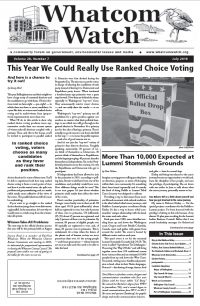1. Background: For almost a half a century (1972 to present), Western Washington University (WWU) has not built a dormitory on campus, while increasing enrollment by 50 percent (5,000+ students) over the same period. WWU continues to house only about 4,000 students on campus leaving 10,000+ to compete for rental lodging with local residents, including workers and families. Bellingham is now experiencing a severe rental housing shortage. The university plans to add another 2,000 students in the next 5-10 years while adding a marginal 260 dormitory beds on campus by 2021.
Should the university be brought to the table as a major cause of the shortage of rentals in the city? What demands are you willing to make of the university to assist in mitigating Bellingham’s severe rental shortage?
Yes, the university administration needs to discuss any enrollment increase with the city council / administration. The sooner we begin this dialogue the better. I would begin with trying to determine what impact, economic or otherwise, past enrollment increases have had on the city, what financial “incentives” have been given in the past from either entity, and what the university intends to do about housing for current and future enrollment, especially since they have an undisclosed number of homeless students.
2. Background: For businesses to be effective in our information-intensive economy, they need bandwidth delivered on a fiber-optic infrastructure, which provides speed and reliability. Bellingham city government has not yet made the commitment to pursue an effective fiber-optic infrastructure that is offered as an open-access network, giving co-ops, as well as telecoms, access. Doing so would attract new businesses and would provide a wider variety of internet options for existing businesses and residents. We have our neighbor, Mt. Vernon, as a model for success in doing this.
Do you feel that identifying the city’s current network, and adding to it as necessary to create a reliable fiber infrastructure is a priority?
I support a city owned fiber optic network as a public utility with the installation thru existing or new infrastructure. It is a necessity; but, not as high a priority as the climate emergency (change), affordable housing/homelessness, wealth inequality and declaring Bellingham a sanctuary city.
3. Background: The current Bellingham Comprehensive Plan envisions that future population growth will find housing in high-density urban villages. How best to provide additional housing in the city is an ongoing discussion. For example, new city code now permits backyard dwelling units.
Do you favor permitting multifamily housing, like triplexes, in areas of the city now zoned exclusively for single-family, detached homes?
I favor multifamily and multi-resident housing in all areas of the city. We can no longer afford from both an environmental and economic standpoint to exclude any type of housing from tiny homes to single family homes. Not everyone desires nor can afford a single family (detached) home.
4. Background: Nearly a half mile of Whatcom Creek and its estuary are about to have large-scale development projects started, none of which appear to put any emphasis on habitat, climate adaptation (sea level rise), or stormwater runoff. Each of these projects is completely under control of, or the property is owned by, the port, city, or school district. The permits for the State and Ellis bridges were rushed specifically to avoid impending state updates to shoreline and riparian rules.
What tactics and plans do you have to aggressively restore habitat and enforce the buffers and best management practices suggested by science, new state legislation, and by the city’s own Critical Areas Ordinance?
After requesting and being given a complete briefing by city planning and other entities on these developments, I will insist that ALL environmental laws, regulations and rules be adhered to. If they are not or the best estimate is that they will not, then I will seek to have the developments delayed or cancelled. Environmental impacts are the only priority and are not to be overridden by other considerations.
5. Background: “Transportation is the largest source of greenhouse gas emissions in Bellingham, making up 32 percent of all community emissions.” (From the Bellingham Climate Action Plan.)
In recent years, Bellingham has made progress towards an active transportation network that helps reduce our carbon footprint as well as families’ transportation costs. More people are able to get where they need to go by walking, pedaling, and rolling (such as wheelchairs).
However, the connections for safe and active transportation are a long way from being complete, due to U.S. transportation planning that has for decades prioritized the movement of motor vehicles.
What transportation planning and funding solutions will you champion to accelerate both Bellingham’s reduction of carbon emissions and progress toward a safe and connected active transportation system for all ages and abilities?
I favor any planning and funding solutions that do not involve fossil fuel based vehicles. We need everything from walkable / rollable areas for all including sidewalks in every locale to easy access points for public and multi-modal transportation. Another complete review of existing plans and any ideas from the community needs to be accomplished at the earliest opportunity.
6. Background: The Bellingham Municipal Code 13.16 outlines city regulations for 5G small cell installations. These were drafted in response to a 2018 City Council vote to support 5G installs. On January 14, 2019, new FCC regulations went into effect denying local municipalities the right to refuse 5G installations. So, Bellingham is set to proceed, yet there is an increasing outcry nationally and globally about the lack of scientific testing for safety, environmental effects, security and privacy issues. There is strong scientific basis for all these concerns. Some cities and states are suing against the FCC overreach. The Portland mayor refuses to proceed on the basis of health safety concerns, as well as FCC overreach.
What is your stance on supporting 5G installation in Bellingham?
I would seek to suspend 13.16 until and if we receive assurances from the best science and engineering sources that there will be no harm created by these installations in any of the areas mentioned. As for the FCC ruling, they were wrong about net neutrality, and I strongly suspect they are wrong about 5G.





























